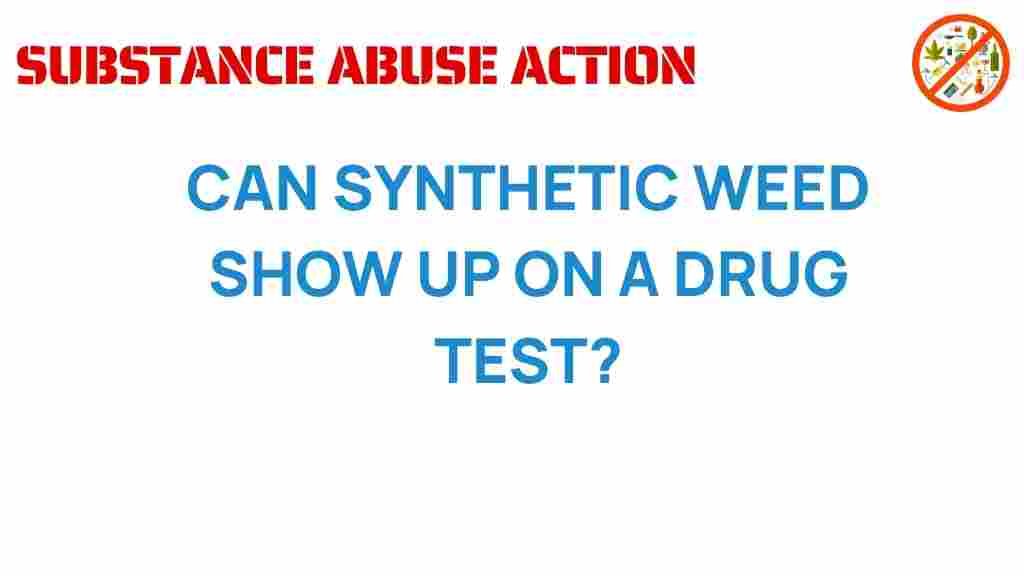The Surprising Truth: Can Synthetic Weed Show Up on a Drug Test?
Synthetic weed, also known as synthetic cannabinoids or K2/Spice, has gained popularity in recent years as a legal alternative to marijuana. However, the question remains: can synthetic weed show up on a drug test? Understanding the implications of synthetic weed, especially regarding drug tests, is crucial for users, employers, and healthcare professionals. This article will delve into the science of synthetic weed, how it interacts with drug tests, the health risks associated with its use, and the legal implications of using these substances.
What is Synthetic Weed?
Synthetic weed refers to a range of man-made chemicals that are designed to mimic the effects of THC, the principal psychoactive compound found in marijuana. These substances are sprayed onto plant material and marketed as herbal incense or smoking blends. Users often turn to synthetic weed for a legal high, but the reality is much more complex.
How Does Synthetic Weed Differ from Marijuana?
While both synthetic weed and marijuana can produce similar effects, the composition and effects can be vastly different. Here are some key differences:
- Source: Marijuana is a natural plant, while synthetic weed is chemically synthesized.
- Compound Variability: Synthetic weed can contain various chemicals that may not be fully understood, leading to unpredictable effects.
- Legality: Marijuana legality varies by region, while synthetic weed has often been marketed as a legal alternative, though this is changing as laws evolve.
Understanding Drug Tests and Synthetic Weed
Drug tests are commonly used to detect the presence of drugs in a person’s system. The most frequent type of drug test utilized is a urine analysis. Generally, traditional drug tests are designed to detect THC and its metabolites. However, the situation with synthetic weed is not as straightforward.
Can Synthetic Weed Show Up on a Drug Test?
The answer to whether synthetic weed can show up on a drug test is complicated. Standard drug tests typically do not screen for synthetic cannabinoids. However, more advanced testing methods can detect these substances, depending on the specific compounds present in the synthetic product used.
Types of Drug Tests
Here are the most common types of drug tests:
- Urine Tests: The most common type, primarily looking for THC and its metabolites.
- Saliva Tests: Often used for roadside testing; can detect recent use.
- Hair Tests: Can detect drug use over a more extended period, but may not be as effective for synthetic cannabinoids.
- Blood Tests: Less common but can provide a comprehensive overview of recent drug use.
Detection Times for Synthetic Weed
Depending on the testing method and individual factors, synthetic weed can be detectable in the body for varying periods:
- Urine Analysis: 1-3 days for occasional use; up to a week or more for regular users.
- Saliva Tests: Typically up to 24 hours after use.
- Hair Tests: May show traces for up to 90 days.
Health Risks Associated with Synthetic Weed
While many users turn to synthetic weed to avoid the legal implications of marijuana use, the health risks are significant and often underestimated. Some of the health risks include:
- Severe Anxiety and Panic Attacks: Many users report heightened anxiety levels.
- Psychosis: Synthetic cannabinoids can lead to symptoms like hallucinations and delusions.
- Cardiovascular Issues: Increased heart rate and blood pressure can occur.
- Dependence and Addiction: There is a potential for addiction, especially with regular use.
Legal Implications of Synthetic Weed
The legality of synthetic weed is a significant concern. Although it has been marketed as a legal alternative to marijuana, many jurisdictions have enacted laws to ban specific synthetic cannabinoids. Here’s what you need to know:
- State Laws: Many states have made synthetic weed illegal, recognizing its health risks.
- Federal Regulations: The federal government has also taken steps to classify synthetic cannabinoids as controlled substances.
- Testing Policies: Employers may have specific policies regarding synthetic weed use, which could impact employment.
Signs of Addiction to Synthetic Weed
As with other substances, addiction to synthetic weed can develop. Signs of addiction include:
- Increased tolerance (needing more to achieve the same effects).
- Withdrawal symptoms when not using.
- Continuing use despite negative consequences.
What to Do If You’re Facing a Drug Test
If you’re concerned about a drug test and have used synthetic weed, consider the following steps:
- Know the Testing Method: Understand whether a urine analysis or another method will be used.
- Time Frame: Consider how long it has been since your last use and the potential detection window.
- Consult a Professional: If you’re unsure, consult with a healthcare professional for guidance.
Troubleshooting Tips for Drug Tests
Here are some troubleshooting tips if you’re facing a drug test:
- Stay Hydrated: Drinking water may help dilute your urine, but this can also be detected as an attempt to mask drug use.
- Consider Timing: If possible, delay the test to allow more time for the substances to clear from your system.
- Seek Support: If you’re concerned about addiction or health risks, consider reaching out to support groups or healthcare providers.
Conclusion
The use of synthetic weed poses unique challenges, especially regarding drug tests. While standard urine analyses may not detect synthetic cannabinoids, advanced testing can reveal their presence. The health risks, legal implications, and potential for addiction are significant concerns for users. Understanding these factors is crucial for making informed decisions. If you or someone you know is struggling with synthetic weed use, consider seeking help.
For more information on marijuana and its effects, visit National Institute on Drug Abuse. Additionally, if you need support regarding substance use, consider reaching out to local resources or support groups.
For more on drug testing policies, check out this comprehensive guide.
This article is in the category Addiction and created by SubstanceAbuseAction Team

Appreciate the deep dive into THCA effects! If anyone wants to try THCA for themselves,https://www.thca4cheap.com is the place to go.High potency and always fresh!